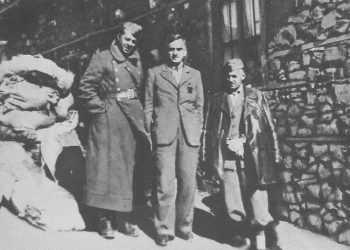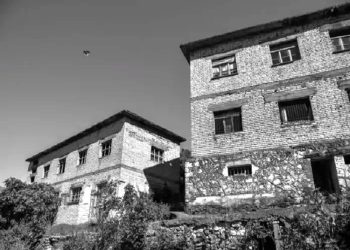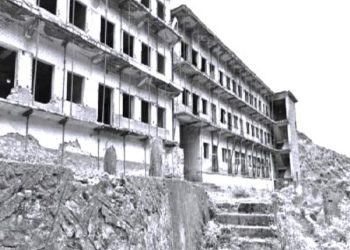Dashnor Kaloçi
Memorie.al publishes the painful story of Fetih Selenica, originally from Cologne, who during the period of the Zog Monarchy graduated in Law in France and then worked as a judge in various districts of the country. How he denounced communism in the “Majestik” cinema in Korça in 1944 in front of the intellectuals of that city, the revenge of the communists against him just came to power and the debate in court with the terrible prosecutor Nevzat Haznedari where he was sentenced to 15 years in prison and the vicissitudes of family through internments where they died and both elderly parents from starvation…
The lecture given by my father Fetih Selenica with the intellectuals of Korça in the autumn of 1944, in the cinema “Majestik” of the city of Korça, which he closed with the sentence “I do not want bravery, when I do not have it for Albania “It became the main reason why the communists arrested him as soon as he came to power and sentenced him to 15 years in political prison.” The man who testifies for Memorie.al is Nimfa Selenica, who tells the whole painful story of her father Fetih Selenica, who graduated from the Faculty of Law in Toulouse, France and was arrested by the communists after they came to power. Who was Fetih Selenica, what was his past and what did he say about communism in the lecture he gave with the Korça intellectuals in the autumn of 1944 in the “Majestik” cinema in Korça? How he was sentenced to 15 years in political prison by the ruling communist regime and how he managed to get out of prison the political pamphlet entitled “Colder than ice”. What was written in that pamphlet and why after his release from prison did the communists leave Feti to work as a coachman and in the canals of Myzeqe where he died at the age of fifty-five in 1961?
Graduated in Toulouse, France
Fetih Selenica, was born on April 27, 1906, in the village of Selenica of Pisha, which at that time was included in the sub-prefecture of Kolonja. His family was very poor and his father, Novruz Selenica, was very well known as a member of the committees of the committees that were fighting against the Ottoman invaders at that time, as well as later with Themistokli Gërmenji’s gang. After his family moved to the city of Korça, Fetiu enrolled and continued the French Lyceum of that city, which he graduated with excellent results in 1927. Regarding this period, his daughter Nymph, testifies: “After After graduating from high school, his father was appointed as a teacher in several villages of Korça, where he worked until 1932. In that year his father was approved to apply for higher education abroad and the Ministry of Education never awarded him a state scholarship for Jurisprudence at the University of Toulouse in France During the three years that his father continued his studies at that faculty, he had close friendships with Manol Konomi and other Albanian students studying in France at that time, such as Epimanonda Bulka, Nedim Kokona, Rexhep Bako, Mehmet Babamusta, Namik Jusufati, Xhemal Kadiu, etc. After graduating from the University of Toulouse in 1934, the father returned to Albania and was appointed as a judge in several districts of the country such as Vlora and Kavaja and then in the city of K orce where he served as President of the Court of Fact. Korça was the penultimate city where his father ended his short career as a lawyer, because in 1943 when the Italians recognized Ethnic Albania, he worked for almost a year as a judge in the city of Tetovo. From 1934 until 1944, when his father served as a member and President of the Court in these cities, he was known and regarded by all as a trained jurist and an uncompromising man.
Denounces Communism in “Majestic”
Fetih Selenica was a man of nationalist conviction and a staunch anti-fascist. Based on this fact, during the period of Italian occupation of the country, he was persecuted by them and barely escaped without being imprisoned while serving in the Court of Peace in Tirana. Likewise, although Fetiu did not join any political force at the time, he was a staunch anti-communist. In this regard, his daughter Nimfa testifies: “His father openly expressed his anti-communist ideas and beliefs in a meeting held with Korça intellectuals at the end of 1944 in the” Majestik “cinema in the city of Korça. In that meeting attended by almost all the cream of Korça intellectuals, the father gave a long speech on the communist danger threatening the country, explaining the philosophy of that doctrine since its inception and the horrors it had caused, especially in the Soviet Union. . At the end of his speech, he said: “I do not want bravery, when I do not have it for Albania”. The allusion to this sentence that the father used at the end of his talk was more than clear to all present in that room. He wanted to show them that the war the communists were waging was betrayed and that the Party leadership it was all under the command of the Yugoslav communists fighting for the annexation of Kosovo. “From some close friends of my father, I learned that the lecture he gave at the” Majestik “cinema was very well received by all those present who applauded him during it”, Nimfa Selenica testifies about her father, Fetiun, who at the end of 1944 strongly denounced the communist threat that was threatening Albania.
Arrest and sentence 15 years in prison
The word that the lawyer Fetih Selenica delivered that autumn afternoon in the meeting with the Korça intellectuals in the “Majestic” cinema, would cost him dearly. The communists did not forget that and as soon as they came to power, they immediately arrested Feti, attributing him as the main accuser. After several months of investigation, the trial against him took place on November 17, 1945, in the “Majestik” cinema in the city of Korça, by the Military Judicial Council composed of President K. Prifti, with members P. Nadedhi and M. Muço and Prosecutor Nevzat Haznedarin. Among others in that trial, between Fetih Selenica and prosecutor Nevzat Haznedari, a debate took place where:
Haznedari: “Why did you go to Tetovo?”
Selenica: “Because the Italians would not follow me there.” Haznedari: “What do you call Ethnic Albania?”
Selenica: “What the Italians expanded”.
Haznedari: “Who followed this policy?”
Selenica: “Balli Kombëtar”.
Haznedari: “Why did you talk about Greater Albania?”
Selenica: “No, I did not even propagate it?”
Haznedari: “When did you enter the National Ball?”
Selenica: “I have not changed political parties. I knew Faslli Frashëri and Dhimitër Fallon as friends and I had no political connection with them “.
Haznedari: “Did you fight the Occupier?”
Selenica: “Yes.”
Haznedari: To hold a conference in the “Majestic” hall with German bayonets and to claim against the occupier, is it the war of the occupier? Did you hold a conference in “Majestic”? ”
Selenica: “Yes, with the topic” I have nothing to love bravery, when I do not have it for Albania “.
Haznedari: “Was this conference in the interest of the people?” Selenica: “Yes.”
As a result, Fetih Selenica was sentenced to 15 years in political prison by that military court on charges of collaborating with the Balli Kombëtar organization. Regarding Feti’s sentence, his daughter Nimfa testifies: “After the arrest of my father in Korça, all the belongings of our house that we had at the exit of the city came to us, where the road to Boboshtica starts. Also that day we were seized and all the very rich library books that my father had, taking the ones we had distributed to our neighbors. Following his father’s arrest, he and his brother Tahir Selenica were arrested and sentenced to eight years in prison. At that time after their arrest we remained in a miserable economic situation, as we also had both father’s parents at home, who were in old age. To escape from hunger, (according to the father’s order) the mother took us small children and we came to Tirana to our uncle Kujtim Ismailati. “Shortly after our departure, (in 1947) both of my father’s parents died in deep misery one after the other, as they had nothing to eat,” Nimfa Selenica recalls of her family’s suffering after her father’s arrest in 1945.
Internment in Myzeqe
Fetih Selenica served his sentence in the terrible camps of Burrel, Maliq, Vloçisht, Beden, etc. Regarding this period, the daughter Nymph testifies: During those eleven years, our mother followed her father by bringing him a bag of food to all the camps and prisons that sent him. My father told us that he had gone through the greatest horror in the Vloçisht camp, where they worked in the water among the owls. Throughout the sentence period, the father was busy with writing and he was able to pull out of prison four thick notebooks. There he kept various notes and mainly collected folklore and wrote about the life and customs of different regions of Albania, which he had learned from the mouths of convicts he had in those camps and prisons. But what is worth mentioning is the political pamphlet entitled “Colder than ice” which his father wrote in 1947. He took that pamphlet out of prison by putting it in the jacket liner and during the years of the communist regime, it was guarded by our uncle Kujtim Ismailati. His father was released in 1955 and after his release from prison he was hired as a coachman at the Partizani Factory where he worked for two years. Two years later, in 1957, we were interned on the farm “Çlirim”, in Fier, where my father worked as a farmer in agriculture until May 24, 1961, when he died of a heart attack.
“Colder than ice”, Selenica’s anti-communist pamphlet he wrote in ’47 when he was in prison and managed to get him out of there
O magnet, strong is your pull on metals, but stronger is the pull of communism on immature minds. You, with your power pull only metals and these come after without objection according to the physical law. Communism, with its beautiful demagoguery, with its magical beacon, with promises that pass every wish, traces in the dark the ambitious, the adventurers, the born criminal people, the pessimists, introduces some new and naive young men into its tower of shining iron, closed the exit door once and for all, snatched away the good feelings they might have, disappeared soul, strengthened body, filled the mind with beautiful ambitious dreams, armed them with a poison knife and then, mobilized against other people, who want to protect freedom, humanitarian feelings, manhood, honor, family, Homeland, religion, customs, their work and its fruit. And with the false flag of the worker and the farmer, with the slogan of the dictatorship of the workers, holds the dictatorship of the few, erases everything holy and old of man, robs without restraint everything he likes to fatten the leading leaders, hangs on rope and bury alive in the canals those he does not need and others he binds with the shackles of hunger and cold, to use as working animals in the Chinese walls, in the Egyptian pyramids and in the canals of Russian hydropower plants while to die. Those most fortunate who escape the storm, smash them through the cold dungeons with cement, without light, without fire, with a ration of dry bread, waiting to give their souls legally with the minutes of the director of the prison. But some of these “privileged” instead of dying, more of their willpower, want to live and live. They want to live because they think their families are suffering from various material and moral tortures: they want to live as idealists and think of the Homeland despised by the enslaved Albanians themselves, they want to protect the millennial human civilization and what is most precious to every man, freedom, the spirit of life. They are not impressed by the torture from the cold, they live in the spirit of hope. Outside the prison on cement walls, the dictatorship must be kept in the great prison of the people, the dictatorship must be kept that the people must work as long as they have bones and skin, be nourished as much as they can stand, because whoever works eats as much assigned to. The dictatorship must be maintained at all costs, new meats are needed, new victims of camps and new prisons. Under communism everything is feasible. If the “reactionary dogs” in prisons have the hope of life and salvation, new forms must be found against them and the innovators rewarded. Drunk with artificial hatred, enthusiastic about ranks and decorations, eager for other robberies, they attack whoever wins first. Other processes open and late at night engine noise begins to cover the screams of torture. Wood, kicks, whips, handcuffs with screws, squeezing the gums with pliers, hanging on the nail, torture of the head lice that of electric current are no longer used. Other ongoing ways need to be found so that there is no crisis in the realization of the daily norm by both the police and the investigator. The man wondered in the January frost naked in the cement dungeon, how the frozen water under his bare feet, the water that the innovative executioner threw on the naked body did not become a compact part with his body, but flowed from the body and smashed it into the unconscious cement, and went and joined under his feet with the equally cold ground. When he was mentioned, he was surprised that he felt alive. He shivered like a perch in a storm, gritted his teeth in the cold, and jumped into the cement to warm himself a little. I remember some doctors who visited the prisoners, not to come to medical aid, but to ascertain their condition, who said that the prisoners have violated the laws of medical science and make an exception. In fact, some of them could not resist, while another part in the conditions in which he lived, had to end necessarily, but he was still standing. Cement is cold, his mind says, always shaking. But no! Ice is colder than cement. Winter in Siberia is colder than ice. We must not forget that the summer sun will melt the Siberian sun and the light of truth and Freedom will shine. The magnet will remain a magnet, and communism will be melted by the sun of human civilization. As in many historical eras, light has dispelled darkness. Freedom and justice defeat slavery and deception. The light of truth and Freedom will blind the one who loves darkness and will open the eyes of the one who is blinded by the magic of the communist tower. And communism will be shown as a nightmare! Memorie.al










